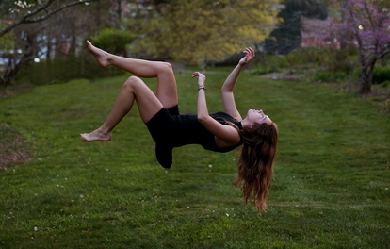The Division of Parts
1.
Mother, my Mary Gray,
once resident of Gloucester
and Essex County,
a photostat of your will
arrived in the mail today.
This is the division of money.
I am one third
of your daughters counting my bounty
or I am a queen alone
in the parlor still,
eating the bread and honey.
It is Good Friday.
Black birds pick at my window sill.
Your coat in my closet,
your bright stones on my hand,
the gaudy fur animals
I do not know how to use,
settle on me like a debt.
A week ago, while the hard March gales
beat on your house,
we sorted your things: obstacles
of letters, family silver,
eyeglasses and shoes.
Like some unseasoned Christmas, its scales
rigged and reset,
I bundled out gifts I did not choose.
Now the houts of The Cross
rewind. In Boston, the devout
work their cold knees
toward that sweet martyrdom
that Christ planned. My timely loss
is too customary to note; and yet
I planned to suffer
and I cannot. It does not please
my yankee bones to watch
where the dying is done
in its usly hours. Black birds peck
at my window glass
and Easter will take its ragged son.
The clutter of worship
that you taught me, Mary Gray,
is old. I imitate
a memory of belief
that I do not own. I trip
on your death and jesus, my stranger
floats up over
my Christian home, wearing his straight
thorn tree. I have cast my lot
and am one third thief
of you. Time, that rearranger
of estates, equips
me with your garments, but not with grief.
2.
This winter when
cancer began its ugliness
I grieved with you each day
for three months
and found you in your private nook
of the medicinal palace
for New England Women
and never once
forgot how long it took.
I read to you
from The New Yorker, ate suppers
you wouldn’t eat, fussed
with your flowers,
joked with your nurses, as if I
were the balm among lepers,
as if I could undo
a life in hours
if I never said goodbye.
But you turned old,
all your fifty—eight years sliding
like masks from your skull;
and at the end
I packed your nightgowns in suitcases,
paid the nurses, came riding
home as if I’d been told
I could pretend
people live in places.
3.
Since then I have pretended ease,
loved with the trickeries of need, but not enough
to shed my daughterhood
or sweeten him as a man.
I drink the five o’ clock martinis
and poke at this dry page like a rough
goat. Fool! I fumble my lost childhood
for a mother and lounge in sad stuff
with love to catch and catch as catch can.
And Christ still waits. I have tried
to exorcise the memory of each event
and remain still, a mixed child,
heavy with cloths of you.
Sweet witch, you are my worried guide.
Such dangerous angels walk through Lent.
Their walls creak Anne! Convert! Convert!
My desk moves. Its cavr murmurs Boo
and I am taken and beguiled.
Or wrong. For all the way I’ve come
I’ll have to go again. Instead, I must convert
to love as reasonable
as Latin, as sold as earthenware:
an equilibrium
I never knew. And Lent will keep its hurt
for someone else. Christ knows enough
staunch guys have hitched him in trouble.
thinking his sticks were badges to wear.
4.
Spring rusts on its skinny branch
and last summer’s lawn
is soggy and brown.
Yesterday is just a number.
All of its winters avalanche
out of sight. What was, is gone.
Mother, last night I slept
in your Bonwit Teller nightgown.
Divided, you climbed into my head.
There in my jabbering dream
I heard my own angry cries
and I cursed you, Dame
keep out of my slumber.
My good Dame, you are dead.
And Mother, three stones
slipped from your glittering eyes.
Now it’s Friday’s noon
and I would still curse
you with my rhyming words
and bring you flapping back, old love,
old circus knitting, god—in—her—moon,
all fairest in my lang syne verse,
the gauzy bride among the children,
the fancy amid the absurd
and awkward, that horn for hounds
that skipper homeward, that museum
keeper of stiff starfish, that blaze
within the pilgrim woman,
a clown mender, a dove’s
cheek among the stones,
my Lady of first words,
this is the division of ways.
And now, while Christ stays
fastened to his Crucifix
so that love may praise
his sacrifice
and not the grotesque metaphor,
you come, a brave ghost, to fix
in my mind without praise
or paradise
to make me your inheritor.


